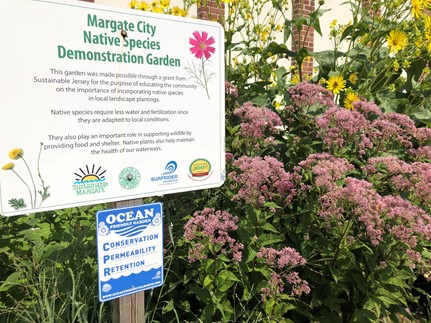 STEVE JASIECKI/The Sustainable Margate Demonstration Garden outside the Municipal Complex shows how native plantings enhance the local environment.
STEVE JASIECKI/The Sustainable Margate Demonstration Garden outside the Municipal Complex shows how native plantings enhance the local environment.
Submitted by STEVE JASIECKI
MARGATE - In the spirit of improving the quality of life for all citizens locally and globally, the City of Margate adopted a Green Grounds and Maintenance Policy. This policy was put into effect back in 2016.
This policy is part of a comprehensive approach to operating the municipality in an environmentally friendly, resource efficient manner in order to maintain its parks, gardens and landscaped areas. The purpose is to help improve water quality, enhance wildlife habitat, improve public health and reduce operating costs. This includes landscaping with low-maintenance plantings, maximizing water conservation and minimizing surface runoff, utilizing recycled and composted materials and taking eco-friendly approaches to integrate pest management.
To further protect the environment, the city encourages its residents to follow these practices on their property. It is important that the quality of the environment and resources remains in a state that is safe from water runoff pollution due to pesticides, herbicides and other such contaminants that will harm wildlife and cause detriment to our waterways.
Responsible landscape management practices can be implemented by the following methods:
Recycled Materials and Composting
Compost landscape waste (e.g. leaves, prunings, etc.) or use the waste as mulch
Efficient Landscape Design
Use native species instead of exotic plants whenever possible. Native species require less maintenance and provide valuable habitat for local wildlife.
Avoid excessive fertilizer use
Test soils for PH to determine which plants are best-suited to the soil type.
Further test soils to determine composition and then apply specific fertilizers to correct soil chemistry if needed instead of using a generic mix that often provides excess phosphorus.
Minimize Water Consumption
Design landscaping with storm water management in mind.
Consider property contours and create plantings that will slow water flows and filter runoff to improve groundwater recharge and prevent erosion.
Improve irrigation with efficient watering schedules, improved irrigation equipment and rainwater capture.
Water the landscape only when needed and utilize efficient irrigation techniques, such as drip irrigation systems.
Install rain sensors on lawn sprinkling systems.
Be sure to search for and fix leaks promptly.
Integrate Pest Management
Significantly reduce or eliminate the use of conventional pesticides through an Integrated pest management program.
By taking an environmentally responsible approach to landscaping, the municipality will reduce its carbon footprint, reduce ecological damage from pesticides, save water, mitigate storm-water runoff, increase biodiversity, protect the bays and ocean and make for a more attractive community.